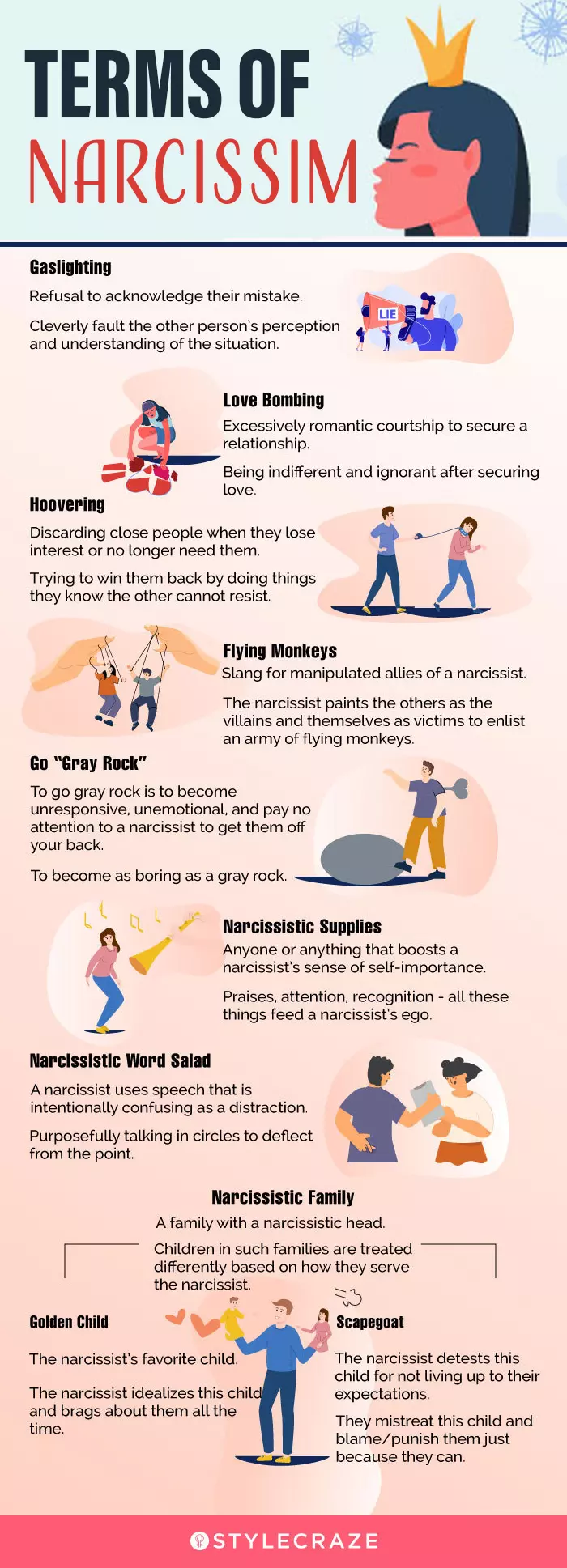11 Best Ways To Deal With A Narcissistic Husband
Because you can always find ways to work through it with a little guidance and help

Image: Shutterstock
Marriage is a lifelong commitment. But, being married to a narcissist can take a toll on your mental health. Wondering how to deal with a narcissistic husband? Narcissists are self-centered and lack empathy. They need constant attention and validation. Typically, they do not perceive their behavior as toxic, however, depending on the extent of their traits, it could be a serious problem. Narcissist personality disorder (NPD), which is associated with narcissistic behavior, is a mental health condition that may require treatment (1). Yet, few narcissists will enter treatment due to their underlying perceived inferiority, masked by a false superiority. This makes it more important for the people around them to learn how to deal with a narcissist effectively.
If you are married to a narcissistic man, you must be prepared to deal with him. Read on to learn how to deal with a narcissistic husband without ruining your relationship.
In This Article
Importance Of Understanding Narcissism
Before learning how to deal with a narcissistic husband, it is important to understand the core traits of narcissism. Narcissistic individuals often exhibit an inflated sense of self-importance, a constant need for admiration, and a lack of empathy for others (1). In relationships, this can show as emotional manipulation, selfishness, and a tendency to ignore the other person’s feelings. Does your partner ignore your opinions? Do you constantly compromise your boundaries and expectations to make them happy? Do they ever celebrate your accomplishments?
If you are married to someone with these traits, it is important to recognize the behavior so you can better handle the situation and protect your mental health.
Keep reading to help navigate this tricky relationship situation while keeping your sense of self intact.
Key Takeaways
- If you have a narcissistic husband, it is best to have an open conversation with him about it to figure out how to deal with it.
- You can work on your self-esteem, establish clear boundaries, and take him to therapy to help him deal with his behavior.
- It is important to build a support system of family and friends for yourself during this time.
Coping Mechanisms For Dealing With A Narcissistic Husband
While it is not the easiest to be married to a narcissistic partner, some coping mechanisms can make your day better. Here is how to deal with a narcissistic husband without losing your sanity.
1. Have An Open Talk With Your Husband

Breaking up with a narcissist or divorcing may seem lucrative, but hear us out. Narcissists focus mostly on themselves and can’t deal well with criticism (1). They always want to dominate conversations. So, make sure to maintain a level head when you converse.
Here is how you can do it: Let us say your husband often dismisses your feelings and talks over you whenever you try to express concerns. Instead of reacting emotionally, you wait for a calm moment and start the conversation with a neutral tone. You explain how certain behaviors make you feel unheard, using specific examples without blaming him. Rather than saying, “You never listen to me,” you say, “I feel hurt when my words are ignored.”
Most times, even your clear points can be disregarded by your partner. But try to explain to him, in a convincing tone, how his behavior could be hurting you. Avoid accusing and try not to shout at your husband. Having open communication is an effective mode to convey your emotions to your man. If your man is willing to change his behavior, tell him what is good for your relationship.
2. Find Out The Triggers For His Behavior
Try to recognize the roots of his narcissism. Finding out his insecurities that he is trying desperately to cover up can help you deal with your narcissist husband. Consult his relatives or friends who can help you deal with his problem. They might know how long he has been suffering from this mentality. Also, you will be able to know his past.
For example, let us say your husband becomes overly defensive whenever his work performance is questioned. Instead of reacting to his outbursts, you take a step back and start observing patterns. You notice that any mention of failure or criticism leads to him lashing out. After speaking with his sibling, you learn that he grew up in a household where perfection was expected, and mistakes were met with harsh punishment. Understanding this, you approach discussions more carefully.
Many individuals with narcissistic personality disorder (NPD) have reported to have insecurity problems, which often trigger their negative behavior (2). NPD often causes people to have an exaggerated sense of self-importance. If you observe this tendency in recent times, try to find out what could have caused his behavior. The damage to their psyche typically occurs during the toddler years. Narcissists belittle you to feel better about themselves. Once you find out how to recognize these triggers, you can avoid or be prepared for the struggles that may cause.
 Quick Tip
Quick Tip3. Know His True Behavior

Narcissistic people are very charming and magnetic (2). They are good at creating self-flattering images and grand ideas.
For example, let us say your husband is incredibly charismatic in social settings. He is always presenting himself as generous and kind. However, at home, he dismisses your feelings and refuses to take responsibility for hurtful actions. When you try to address his behavior, he deflects by accusing you of being too sensitive. Instead of getting lost in his carefully crafted image, you start paying attention to patterns. How he shifts blame, distorts reality, and prioritizes his ego over your well-being.
These people are addicted to feeling very special about themselves, and they lie, cheat, and do whatever they want to get their high. If you question your partner about his behavior, he may question your authority about the same. But knowing his true behavior can help you arrive at an ideal solution.
4. Make A Decision
People with NPD have low self-esteem and will not take any responsibility for their mistakes. Recent studies prove that self-esteem impairment is a key component of NPD (3). Also, it is not easy for a narcissist to understand their behavior and how they are hurting others. At times, you may feel it is difficult to change him – and the only person’s behavior that you can control is your own.
For example, let us say your husband constantly refuses to acknowledge any wrongdoing and continues to manipulate situations to his advantage. You have tried reasoning with him, attending counseling sessions together, and offering support, but nothing changes. Instead of waiting for him to change, you decide whether to accept the relationship as it is or prioritize your own well-being. In making this choice, you reclaim your power and take steps toward a healthier future.
But remember – this doesn’t mean that you can’t have a good marriage; it just may look different than what you might have expected. Your encouraging words, care, and counseling sessions can help him think positively.
5. Stop Your Focus On Him

Narcissistic individuals have attention-seeking behavior (1). They like to keep themselves in the spotlight. No matter how many sacrifices you make for him, your husband may not recognize it and your actions may never be enough for him. You might soon find that your opinions don’t matter. So, stop your focus on him. Spend some time for yourself to pursue your goals and desires. This will make you happier.
For example, let us say your husband always dominates conversations at family gatherings, making everything about himself. At a holiday dinner, instead of trying to gain his acknowledgement, you focus on enjoying the evening with your relatives. You engage in meaningful chats with your siblings, help set up the meal, and laugh with your nieces and nephews. By shifting your attention away from him and toward the people who appreciate you, you leave the gathering feeling content rather than frustrated by his behavior.
6. Speak Up For Yourself
People with narcissistic behavior enjoy watching others suffer as they are incapable of compassion and empathy (4). But if you are facing this issue with your husband, try not to show annoyance. Handle the situation calmly and gently. Speak up for yourself and tell him how his words and behaviors are impacting your life.
For example, let us say you and your husband are attending a friend’s wedding, and he keeps making belittling comments about your appearance in front of others. Instead of shrinking away or reacting angrily, you calmly pull him aside and say, “I don’t appreciate the way you are speaking to me. It’s hurtful, and I expect to be treated with respect.” Whether he acknowledges it or not, you have set a boundary. If he continues, you choose to step away and enjoy the celebration with friends who treat you kindly, refusing to let his words ruin your evening.
Also, be consistent and clear about what kind of behavior you are expecting from him. But be prepared for the fact that he may not listen to you or he may even ignore you. If he continues to ignore you and doesn’t show any care for you, you may choose to walk away from the relationship.
7. Work On Your Self-Esteem
Self-esteem influences your decisions and choices. Low self-esteem reduces the quality of life in many ways. Narcissists see themselves as superiors and struggle with being empathetic with others (1). They insult other people and tend to knock them down. Verbal and emotional abuse from your husband could be signs of low self-esteem.
For example, let us say you are at a work event where spouses are invited, and your husband constantly interrupts you or makes sarcastic remarks about your achievements. Instead of letting it shake your confidence, you maintain your composure, redirect the conversation back to your accomplishments, and continue engaging with colleagues who respect you. Later, instead of dwelling on his behavior, you remind yourself of your professional success and take pride in how far you have come, reinforcing your self-esteem.
If you are not careful, such behavior can hurt your self-esteem too. Hence, it is important to work on your mental health and self-esteem.
 Quick Tip
Quick Tip8. Establish Clear Boundaries

Setting clear boundaries makes any relationship healthier. Narcissistic individuals are often self-absorbed and want to take lead in the relationship (4). Your husband may not like it when you spend time with your friends. Narcissists also won’t apologize for their mistakes. Also, they have little sense of personal space.
Consider this scenario: You are planning a weekend trip with friends, but your husband insists you cancel because he wants you to stay home with him. Instead of giving in, you calmly explain that spending time with friends is important to you and that you will be going as planned. You set a clear boundary by letting him know that controlling your social life is not acceptable.
Hence, you must set clear boundaries and tell your husband to respect them. Tell your husband what is not acceptable to you and why the consequences should matter to him. Narcissistic individuals only start thinking about things when they are affected.
9. Check Yourself
Dealing with a narcissistic husband who has no concern about another’s state of mind can take a toll on your health. If you are trying to make your relationship healthy but are unhappy with the results, get in touch with your friends and family. Speak to them and get help from them. Talking to them will build your confidence. Also, consult a doctor if you have any anxiety issues.
For example, let us say you have been feeling constantly drained and anxious due to your husband’s dismissive behavior. Instead of keeping it all inside, you decide to visit your sister for the weekend. Talking to her about your struggles helps you feel heard and supported. Realizing the emotional toll, you also book an appointment with a therapist to work through your anxiety and regain your confidence.
10. Keep A Support System

Spending an excessive amount of time with someone with NPD can drain you out. It is common for a narcissist to isolate their spouse from their family and friends. Your husband might want all of your attention and may become jealous if you are spending time with other people. When you are not connecting with a support system, it can become easier for your husband to take control of your life. Hence, it is important to have individuals around you who are offering you the right support.
For example, imagine you have just received a promotion at work and excitedly share the news with your husband. Instead of celebrating with you, he downplays your achievement or shifts the focus back to himself. Rather than seeking his validation, you acknowledge your own hard work and choose to celebrate with supportive colleagues or friends. You remind yourself that his reaction is a reflection of his insecurities, not your worth, and continue to take pride in your success.
11. Take Him For Counseling
Narcissists have low self-esteem and feelings of inadequacy, and often need professional intervention. But many narcissists are against counseling as they think they know more than any therapist, so be wary about this suggestion. Making it seem like a shared problem may make your husband agree to seek counseling. Take responsibility for your actions instead of pushing it all on him.
For example, your husband frequently refuses to acknowledge his hurtful behavior. Instead of directly blaming him, you suggest couples counseling by framing it as a way to strengthen your relationship. You emphasize that both of you can benefit from professional guidance to improve mutual understanding. By presenting it as a team effort rather than a personal attack, you increase the chances of him being open to the idea.
However, counseling can backfire if your narcissistic husband is advised something he does not agree with or finds unpleasant. Colleen Sheehy Orme, a blogger, recounts in one of her blog posts her experience in a marriage counseling session where the term “narcissism” was introduced as a diagnosis for her husband. “We leave that appointment and head home. My husband makes it clear he is done with marriage counseling. Today’s diagnosis has sealed the deal (i),” she notes.
Dealing with a narcissist is never easy, and if the person is your husband, life can be even more challenging. When everything else fails, you can use methods like the Gray Rock Method. It is a communication strategy used to minimize engagement with narcissists. It involves responding in a dull, unemotional, and non-reactive manner to make interactions uninteresting for the other person. By avoiding emotional responses and personal details or engaging in drama, you reduce their ability to manipulate or provoke you. Keeping answers short, neutral, and predictable discourages further attempts at control.
Narcissists have a high sense of self-importance which is often difficult for them to let go. But is there any chance that this can change? Read on to find out.
Can A Narcissist Change?

People diagnosed with narcissism can change and keep their narcissism in check; however, it requires a lot of effort and patience from both parties. A study shows that people with NPD can show significant improvements and change for the better after consistent therapy (5). The traits of the disorder make it difficult for the narcissist to see reason and realize the need for change.
Since this is not a clinical issue, he can try to change his personality and behavior with conscious effort and consistent professional and personal support. For this, he will need to look beyond himself in the mirror and understand the toxic nature and impact of his behavior, realize that he has a problem and commit to getting support and therapy for his issues. The path to changing might be mentally hard as it will require him to abandon years of established behaviors, adopt new behavioral and thought patterns, and develop new habits. Hence, it is important to stand by him and believe in a positive change.
Infographic: Terms Of Narcissism
It is important to spot the signs and obvious red flags pointing to a narcissist. However, sometimes, narcissists are too clever, and hence, we also need to be able to spot patterns in their behavior and surroundings. There are specific terms that categorize these patterns. Check out the infographic below to learn about these terms. Illustration: StyleCraze Design Team
Conclusion
Narcissistic personality disorder manifests in many ugly ways — a need for control, attention, dominance, and a complete disregard for other people’s needs and desires. When you are married to a narcissistic man, you have to either leave them or learn to live with them. The above pointers are some guidelines on how to deal with a narcissistic husband. For instance, establishing boundaries, taking care of your mental health, and communicating well with your partner without triggering their insecurities can help save the marriage without sacrificing your wellbeing.
Frequently Asked Questions
How do narcissists treat their wives?
Narcissistic men try to control and manipulate their wives. In an effort to deceive their wives, they frequently engage in gaslighting them. In addition, they often have affairs and lie to them. If they are successful in doing that, it makes them feel even more powerful.
What kind of woman do narcissists like?
A narcissistic man seeks a woman who will reinforce his belief that he is a superior man. He wants an accomplished woman to be his “trophy” wife. Narcissists frequently find themselves drawn to powerful, self-assured, and hard-working women. They typically seek out career-focused women who are ambitious.
How does a narcissist react when they can’t control you?
Narcissists go to great lengths to regain their sense of power if they can no longer control you. As a result, they will probably feel offended, become enraged, and possibly even begin threatening you.
Illustration: Best Ways To Deal With A Narcissistic Husband

Image: Dall·E/StyleCraze Design Team
Learn 7 useful tips to handle your narcissistic husband when he’s in a rage. Check out this informative video to navigate your relationship safely with him.
Personal Experience: Source
StyleCraze's articles are interwoven with authentic personal narratives that provide depth and resonance to our content. Below are the sources of the personal accounts referenced in this article.
i. This Is What Happened the Day My Husband Was Diagnosed as a Narcissisthttps://medium.com/beloved/this-is-what-happened-the-day-my-husband-was-diagnosed-as-a-narcissist-42266023a230
References
Articles on StyleCraze are backed by verified information from peer-reviewed and academic research papers, reputed organizations, research institutions, and medical associations to ensure accuracy and relevance. Read our editorial policy to learn more.
- Narcissistic Personality Disorder
https://www.ncbi.nlm.nih.gov/books/NBK556001/ - Narcissistic Personality Disorder: Progress in Understanding and Treatment
https://pmc.ncbi.nlm.nih.gov/articles/PMC10187400/ - A Cognitive-Behavioral Formulation of Narcissistic Self-Esteem Dysregulation
https://pmc.ncbi.nlm.nih.gov/articles/PMC10187391/ - The dark side of empathy in narcissistic personality disorder
https://pmc.ncbi.nlm.nih.gov/articles/PMC10097942/ - Can Patients With Narcissistic Personality Disorder Change? A Case Series
https://pubmed.ncbi.nlm.nih.gov/38949659/
Read full bio of Dr Nancy B Irwin
Read full bio of Sneha Tete
Read full bio of Subhrojyoti Mukherjee
Read full bio of Gazala Firdos Ansari




























Community Experiences
Join the conversation and become a part of our empowering community! Share your stories, experiences, and insights to connect with other beauty, lifestyle, and health enthusiasts.